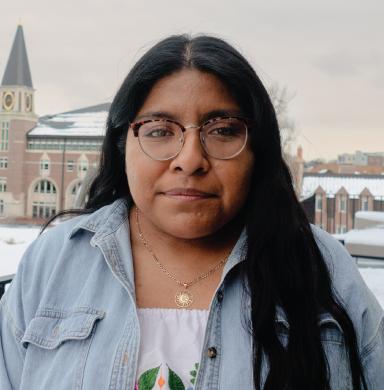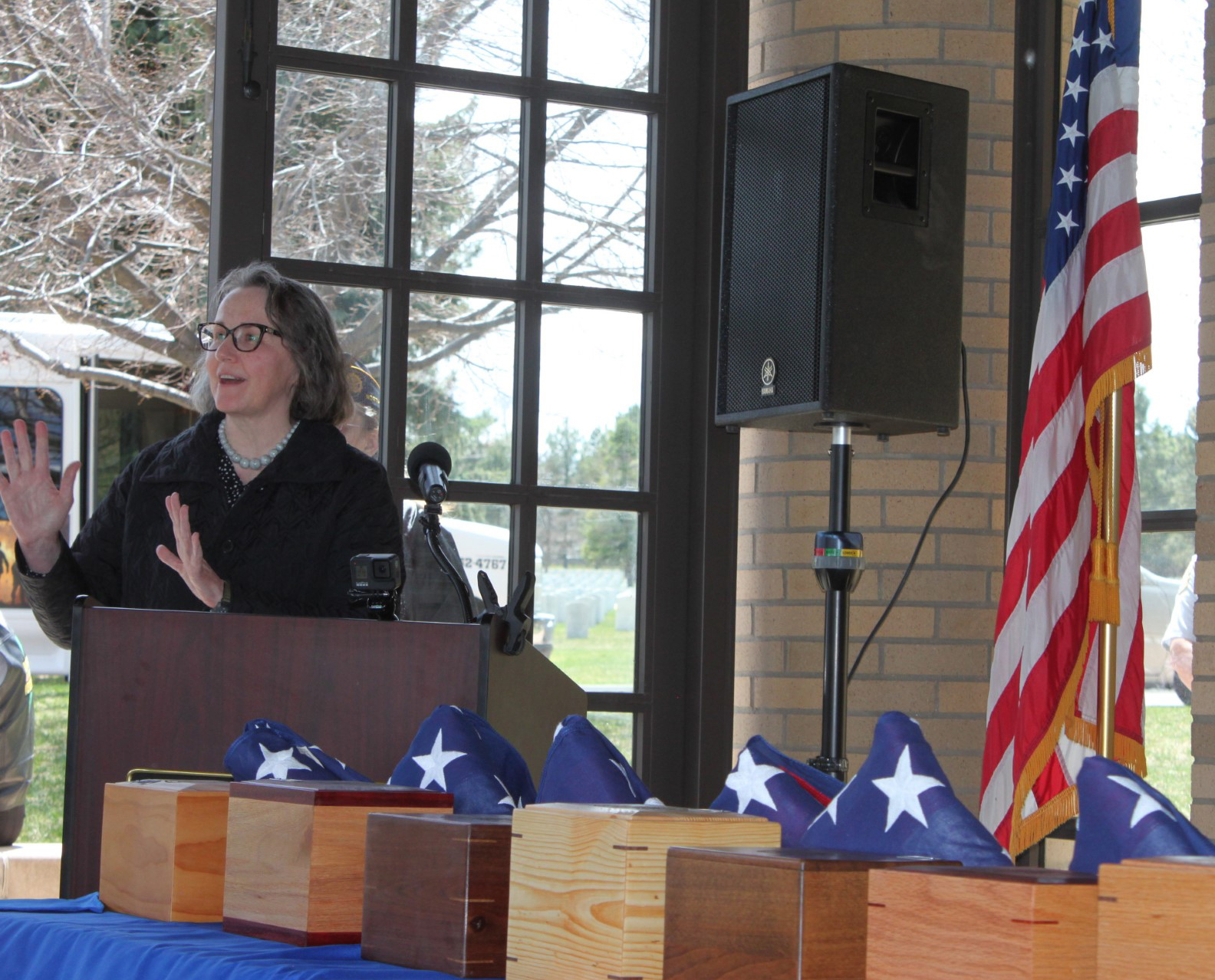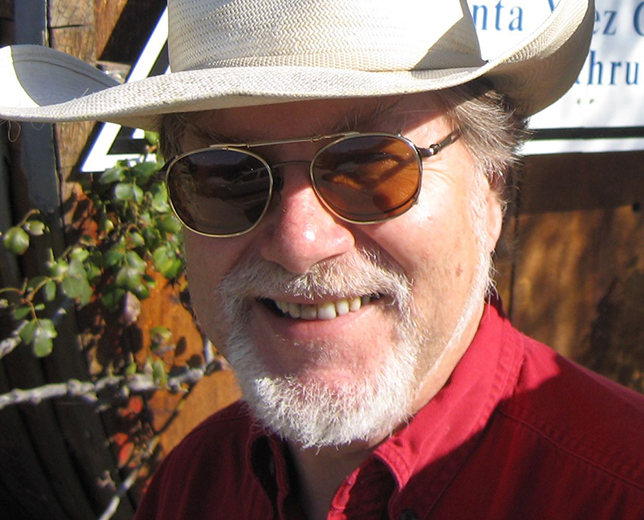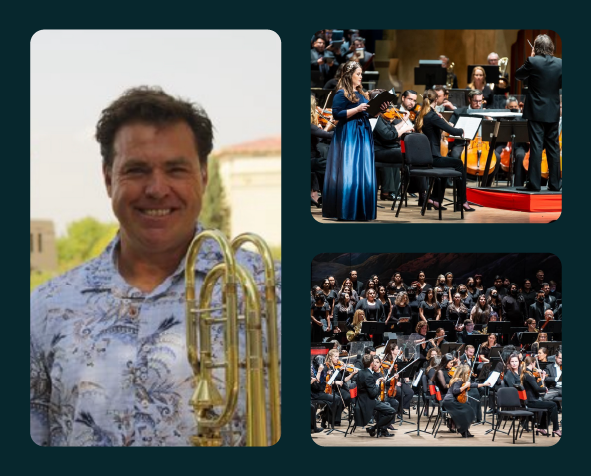CAHSS First-Gen Grad Student to Help Others Find Seats in the Higher Ed Classroom
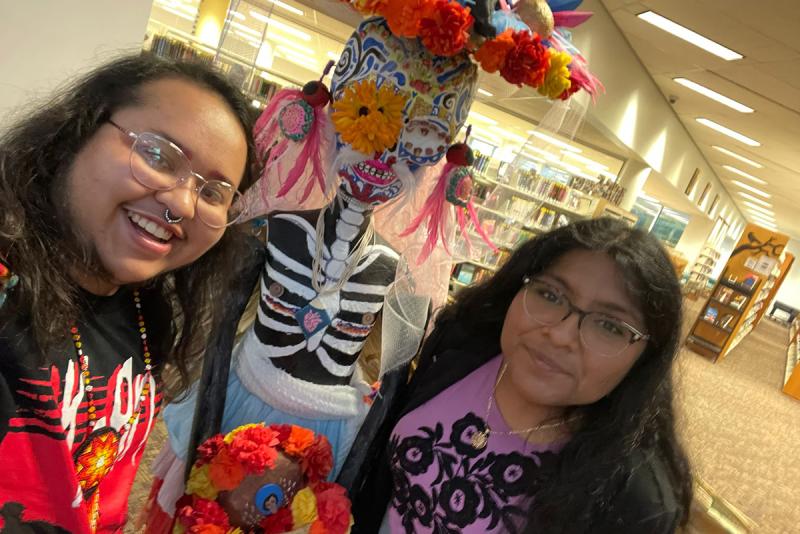
Maria Cruz with her Fortaleza Familiar coworker Nez and Day of the Dead figure.
If You Can Dream It …
The youngest of seven and a first-generation student whose Indigenous family emigrated from Southern Mexico, Maria Cruz grew up speaking English and Zapotec. She shared her early passion for languages with her younger nieces and nephews by teaching them their ABCs. A series of “Fancy Nancy” books she borrowed from the library — featuring a little girl obsessed with visiting France — infused Cruz’ daydreams with visions of Paris and one day visiting, too.
Cruz, who will receive a master’s degree in International and Intercultural Communication (IIC) from the College of Arts, Humanities & Social Sciences (CAHSS) Media, Film & Journalism Studies Department in June, vowed to make her childhood dreams come true. In high school, she elected to take four years of French, hoping to qualify as one of 20 high-achieving French language students selected each senior year for a two-week exchange program in France, but eventually learned the cost of the trip was prohibitive.
Nevertheless, when selected senior year, Cruz’ mother encouraged her to earn the money herself and negotiate a payment plan. Cruz got a job on the assembly line at the packing factory where her mom worked over winter break and later as an after-school youth leader in the local elementary school and gave her teacher every paycheck she earned — eventually enough to pay for the program.
On the second week of the trip, the teacher surprised students by leading an evening walk that ended up at the Eiffel Tower. “I started crying because it was hard to get there and I knew I was the first one in my family to have an opportunity like this,” Cruz said. “It made me realize that even though money is an obstacle, and I might need to work twice as hard, I could do it.”
The experience bolstered her confidence to apply to college, even though “my mother only finished first grade and I was the first woman in my family to pursue higher education after high school,” Cruz said.
Although she had no clue about the college application process and admits to “just winging it,” Cruz applied for and landed a scholarship to Eastern Illinois University where she majored in interpersonal communication and Spanish and interned as an ESL program coordinator.
The professor of an intercultural course she took in junior year encouraged her to apply to grad school. “I was working on projects in the community, looking at how gentrification affects populations of migrants and people of color, and he told me my point of view mattered,” she said.
Finding Her Niche in MFJS
Cruz applied to five graduate programs, visited the University of Denver in spring 2021 and fell in love with the campus and the IIC master’s program. She subsequently received the Anders and Terena Eisner scholarship and the Sehra Eusufzai scholarship, landed a paid graduate assistantship (GTA) and started at DU in fall 2022.
She worked as a GTA for various classes including Associate Professor Lauren DeCarvalho's course on horror films. “I’m not a fan of horror films but the way Lauren taught the class, her passion for the subject was contagious and helped motivate me to find a topic to research that was personally meaningful to me,” Cruz said.
In her role as GTA, Cruz tries to “notice when a student is passionate about a topic and encourages them to pick something important to them to study,” she said, adding that she also works with them to ensure they clearly connect the topic to the theories and concepts they’re learning.
DeCarvalho applauds Cruz’s teaching skills. “I have had the honor of having Maria as my teaching assistant for two courses now, most recently in spring quarter,” she said. “She is an extremely hard worker who always goes above and beyond what is expected and never complains.”
More importantly, DeCarvalho calls Cruz “a truly wonderful human being who gives me hope for humanity and cares deeply about issues regarding social justice and activism. Some of my favorite memories of her have been having conversations around those very topics. I am excited about her upcoming graduation but will miss seeing her around the MFJS building.”
Discovering Causes Close to Home and Heart
An anthropology class Cruz took in winter quarter 2024 on “Indigenous Feminisms” with Assistant Professor Kelly Fayard got Cruz thinking about one day earning a PhD herself. “Being Indigenous and knowing that there are scholars who honor their ancestors through academic study, teaching and writing journal articles made me think I might want to do that, too.”
Cruz also credits Stevie Rose Tohdacheeny Lee, associate director, Diversity, Equity & Inclusion, Native American Initiatives, for ongoing support throughout her grad school journey, especially in teaching her “how to build a community away from home.”
Her independent study project entitled “Power, Consumerism and Indigenous Fashion,” under the direction of Assistant Professor Runchao Liu, focused on Indigenous textiles in Oaxaca, Mexico that are appropriated by fast-fashion industry designers and “why the artisans’ perspectives are not represented in the media,” Cruz said.
Liu considers it “such an honor and a pleasant experience to have witnessed Maria’s growth in the IIC program over the two years I’ve known her and worked with her. Working with Maria throughout this research project reminds me of why many of us went into academia and the value of liberal arts education."
Cruz has been channeling her overall passion for human rights and social justice into an internship with Fortaleza Familiar, a Colorado organization dedicated to fostering the wellness of Indigenous Chicanx, Latinx, Lesbian, Gay, Bi, Queer, Trans and Two-Spirit young people and their families.
Through Fortaleza Familiar, Cruz worked on various cultural and arts events including a Day of the Dead presentation geared toward honoring your ancestors. “I wanted to share how my family honors their loved ones by offering a first-hand Indigenous perspective because Day of the Dead has been really commercialized,” she explained.
As part of the Student Success Coaching program, Cruz mentors other first-gen students. “Sometimes four years can feel like forever for students struggling with higher education obstacles who can feel like maybe they don’t belong at this school even though they like their major,” she said. “It’s very rewarding because I’m now the one giving the advice my mentors gave me on how to navigate college.”
Cruz assures them that they do belong, shares her own experiences coping with imposter syndrome and encourages them to persevere and reach out for help when they need it. She plans to return to her West Chicago community following graduation to give back what she’s learned. “My nieces and nephews are getting to the age where they’re considering college and asking me what they need to do,” she said.
Cruz envisions crafting workshops for high school students and parents on how to apply to college, find scholarships, fill out FAFSA forms and “give them an idea of how the process works and what college looks like in language they can understand.”
As she pictures her parents watching her accept her diploma on graduation day, she can’t help but recall the advice her former Girl Scout leader gave her when she first left for college. “She told me I might be the only brown girl in my classroom but not to let it intimidate me and to always remember that I earned my seat in that classroom,” she said.
